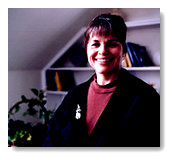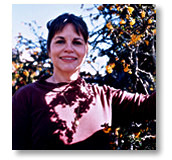
Cynthia Wall in the Office

... and in the Orchard
|
Retail Therapy: By Amara Rose |
|
It's flu season. The feverish desire to spend creeps stealthily into your bones, causing you to cough up dollars at the sound of Santa songs and pleading tots. "Affluenza" is a flu strain that lodges in your wallet, not your lungs. The term originated with a PBS special that defined this new epidemic as "an unhappy condition of overload, debt, anxiety and waste, resulting from the dogged pursuit of more." Misguided by the notion that we can buy our way into who we want to be, we often end up bankrupt, literally and spiritually. "Retail therapy" is the equivalent of a throat lozenge when we need a salve for the soul. Living in "true prosperity" could lend rich new meaning to the term "trust fund." But just what is it? Are we putting our trust in money as the source of our abundance -- or in something beyond the dollar sign? It's no small inquiry. Affluenza substitutes for connection with others, says prosperity coach Joan Sotkin. We can only run out of people -- not money -- she asserts. Because money flows from our connection to others, if you're descending into debt, "you're afraid of being left alone or of abandoning yourself. Money is the energy of relationship. How you deal with money is how you deal with your relationship with yourself and others. You have to make that connection in order for the energy to flow back to you," she says. But what of people who yearn for solitude, for the peace of country living "far from the madding crowd"? Are they doomed to live a life of pious poverty? |
||
|
Cynthia Wall, a licensed clinical social worker who leads prosperity workshops in Mendocino and Marin counties, has lived both city and country lives. She knows the issues. In 1978, she traded student life in Berkeley for a 12-foot x 12-foot cabin in the Mendocino woods. Her rent was $50 a month, and she lived contentedly with an outhouse and woodstove, saving every penny to buy raw land and build a home with her future husband. Beyond developing a strong sense of inner reliance and resilience, Wall forged lasting bonds with her country kin, creating the all-important umbilicus to abundance that Sotkin describes. She says, "Our primary sense of 'social security' isn't knowing that a check will come from the government, but that we can live really simply and take care of ourselves. "People sometimes feel like a bug under glass when they move from the city to a rural area. It's hard to live up here without being neighborly. There's no 7-11 five minutes away, and if the power goes out, it might not come back on for a week or longer. We depend on each other. In cities, there's the safety of anonymity; in the country, there's no anonymity, and it's hungered for." Of course, as she points out, if a country native moved to Silicon Valley, he'd face the same issues in reverse. "I have clients in Mill Valley and the Oakland Hills who tell me they can't afford to live there. They have beautiful homes but they can't pay their credit card bills .... The more money they make, the more they spend on stress reduction. Some of them decide to escape to the country, but then find they can't create 'instant success' in that environment, either. "The bottom line is, there are no quick fixes. Nowhere are you assured of making a real connection," she says. "Money may ease the entry into a lifestyle change, but how you choose to spend your time and whom you attract are not about money, but about who you are, what you value." But awareness of the problem can lead to a cure. Here are a few examples: A woman in one of Wall's workshops realized that an old grief had triggered her spending sprees -- and at the end of a workshop, she cut up seven credit cards. Another acknowledged that she hated the responsibility of her business, sold it, and returned to school to prepare for a community service profession. A third woman felt constricted by her husband's control over their finances. After talking with the financial planner who co-leads Wall's workshops, she realized he was actually doing a great job of saving for their future. As to where one lives, and whether or not we're immune to affluenza, Wall says of her personal choice: "I'm in touch with the land, and that feeds me. The full moon and the sound of the ocean fill me up. Wherever you move, you take yourself with you." |
|
Cynthia Wall in the Office |
... and in the Orchard |